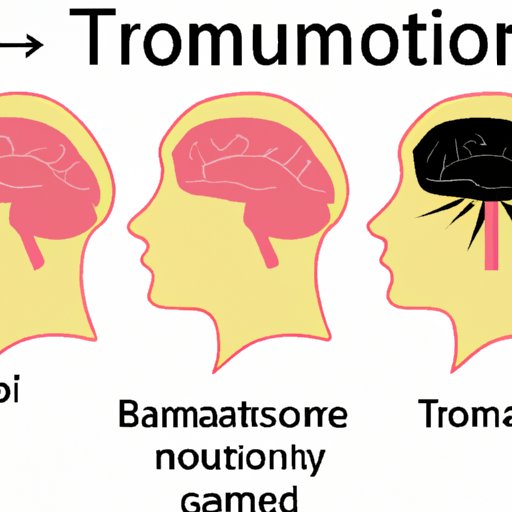
I. Introduction
If you or a loved one has been diagnosed with a brain tumor, you may wonder whether the symptoms associated with this condition are consistent or if they fluctuate. Brain tumor symptoms can indeed come and go, creating uncertainty and stress for those affected by this condition. In this article, we’ll explore the reasons behind the fluctuating symptoms of brain tumors, when to seek medical attention, and strategies for coping with the stress associated with this condition.
II. The Ebb and Flow of Brain Tumor Symptoms: Understanding Why They Come and Go
Brain tumor symptoms can fluctuate over time due to a variety of factors. One such factor is the growth of the tumor itself. As the tumor grows, it can put pressure on different areas of the brain, leading to changes in symptoms. In some cases, the tumor may push on a particular area of the brain, causing symptoms to worsen or become more apparent. In other cases, the tumor may pull away from a particular area of the brain, causing symptoms to improve or disappear.
Another factor that can contribute to symptom fluctuations is treatment effects. Chemotherapy and radiation therapy, for example, can cause side effects such as fatigue, nausea, and cognitive changes that can mimic or exacerbate brain tumor symptoms. Similarly, surgery can cause temporary changes in brain function that can affect how symptoms manifest.
III. When to Seek Help: The Importance of Recognizing the Fluctuating Symptoms of Brain Tumors
Because brain tumor symptoms can come and go, it’s important to monitor them closely and seek medical attention when necessary. If you or a loved one experiences any new or worsening symptoms, it’s critical to seek help immediately. Examples of symptoms that may require urgent attention include:
- Severe or persistent headaches
- Nausea or vomiting that doesn’t improve with medication or changes in diet
- Seizures or convulsions
- Confusion or disorientation
- Weakness or numbness in one side of the body
These symptoms may indicate a serious medical emergency, and prompt treatment is essential. Additionally, if you notice changes in existing symptoms, it’s important to inform your medical team so they can ensure you receive the appropriate care.
IV. The Rollercoaster of Brain Tumor Symptoms: Coping with the Ups and Downs
Experiencing fluctuating brain tumor symptoms can be emotionally taxing, as it can be difficult to know what to expect from day to day. Coping with the uncertainty and stress of these fluctuations requires patience and resilience. Some strategies that may help include:
- Seeking support from family and friends
- Engaging in relaxation techniques such as deep breathing or meditation
- Participating in physical activities that you enjoy, such as walking or yoga
- Participating in support groups or seeking mental health counseling
It’s important to remember that experiencing a range of emotions in response to fluctuating symptoms is normal, and seeking support is a sign of strength.
V. Why Brain Tumor Symptoms Can Vary from Day to Day: Exploring the Factors at Play
In addition to tumor growth and treatment effects, other factors can influence how brain tumor symptoms manifest, including stress and fatigue. Stress can affect the body’s response to pain and other symptoms, causing them to feel more intense or frequent than they might otherwise. Fatigue can also exacerbate symptoms, as it makes it more difficult for the body to manage pain and discomfort.
Managing stress and fatigue is critical for minimizing symptom fluctuations. Strategies that may help include:
- Engaging in stress-reducing activities such as deep breathing, yoga, or mindfulness meditation
- Creating a consistent sleep routine that allows for adequate rest
- Adjusting daily activities as needed to minimize fatigue
- Seeking medical attention for underlying health conditions that may contribute to stress or fatigue
By managing these factors, individuals with brain tumors may be able to minimize the impact of symptom fluctuations and better manage their overall health and well-being.
VI. Don’t Ignore the Signs: Uncovering the Complexities of Do Brain Tumor Symptoms Come and Go?
Despite the fact that brain tumor symptoms can come and go, it’s essential to stay alert to changes in symptoms and seek medical attention as needed. Some individuals with brain tumors may mistakenly believe that fluctuations in symptoms are a sign that their condition is improving, or that they need to “tough it out” and wait for symptoms to improve on their own. However, these assumptions can be dangerous, as they can delay the diagnosis and treatment of a serious medical condition.
It’s important to remember that symptom fluctuations are not always a sign of improvement, and that a careful assessment by a medical professional is the best way to determine the appropriate course of action.
VII. Living with the Uncertainty of Do Brain Tumor Symptoms Come and Go: Tips for Managing the Inconsistent Symptoms
Managing fluctuating brain tumor symptoms requires a multifaceted approach that includes medical care, emotional support, and self-care. Some additional tips for managing the inconsistent symptoms of brain tumors include:
- Staying engaged in hobbies and interests that bring joy
- Setting realistic goals and prioritizing activities that are most important
- Eating a balanced diet that supports overall health and wellness
- Communicating openly and honestly with your medical team and loved ones
By taking a holistic approach to managing brain tumor symptoms, individuals with this condition can better cope with the ups and downs of this challenging journey.
VIII. Conclusion
In conclusion, experiencing fluctuating brain tumor symptoms can be a difficult and stressful experience, but it’s important to remember that help is available. By monitoring symptoms closely, seeking medical attention as needed, and engaging in self-care strategies, individuals with brain tumors can promote their overall health and well-being. Remember, you are not alone – many individuals have successfully managed the symptoms associated with brain tumors, and with the right support, you can too.




